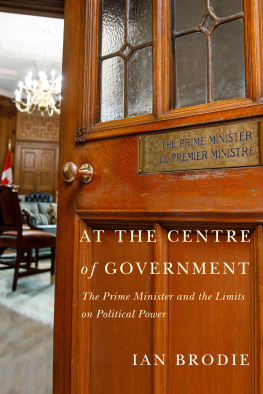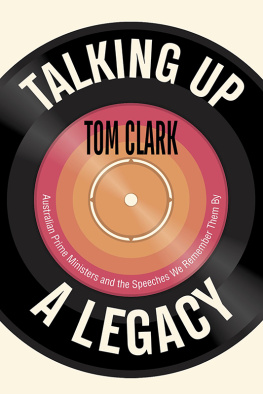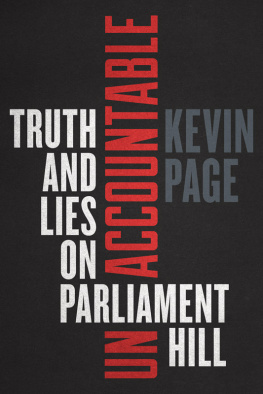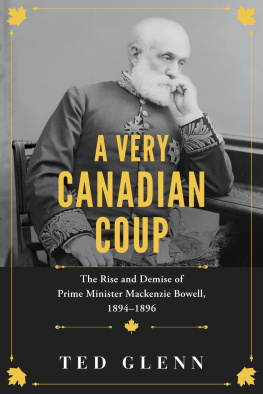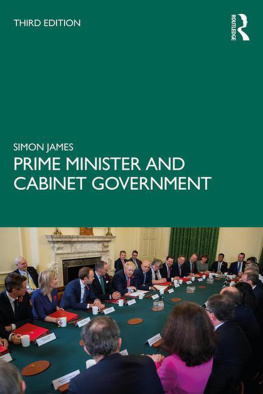
At the Centre of Government
AT THE CENTRE
OF
GOVERNMENT
The Prime Minister
and the
Limits on Political Power
I A N B R O D I E
McGill-Queens University Press
Montreal & Kingston | London | Chicago
McGill-Queens University Press 2018
ISBN 978-0-7735-5290-6 (cloth)
ISBN 978-0-7735-5377-4 (ePDF)
ISBN 978-0-7735-5378-1 (ePUB)
Legal deposit second quarter 2018
Bibliothque nationale du Qubec
Printed in Canada on acid-free paper that is 100% ancient forest free (100% post-consumer recycled), processed chlorine free

We acknowledge the support of the Canada Council for the Arts, which last year invested $153 million to bring the arts to Canadians throughout the country. Nous remercions le Conseil des arts du Canada de son soutien. Lan dernier, le Conseil a investi 153 millions de dollars pour mettre de lart dans la vie des Canadiennes et des Canadiens de tout le pays.
Library and Archives Canada Cataloguing in Publication
Brodie, Ian Ross, 1967, author
At the centre of government : the Prime Minister and
the limits on political power / Ian Brodie.
Includes bibliographical references and index.
Issued in print and electronic formats.
ISBN 978-0-7735-5290-6 (hardcover).
ISBN 978-0-7735-5377-4 (ePDF).
ISBN 978-0-7735-5378-1 (ePUB)
1. Canada Politics and government. 2. Legislative power Canada. 3. Executive power Canada. 4. Canada. Parliament Powers and duties. 5. Separation of powers Canada. 6. Federal government Canada. 7. Constitutional law Canada. 8. Prime ministers Canada. 9. Canada. Office of the Prime Minister. I. Title.
JL75.B72 2018 | 320.971 | C2018-900620-X |
C2018-900621-8 |
This book was designed and typeset by studio oneonone in Minion 10.5/13.
Contents
Acknowledgments
From 1988, when I gave up my engineering studies and transferred to McGills undergraduate program in political science, until 2003, when I took a leave of absence from the faculty of the University of Western Ontario, I was a student of democratic government. Then, from spring 2003, when I went to work for Stephen Harper in the Opposition Leaders Office on Parliament Hill, until I left his Prime Ministers Office in June 2008, I was a practitioner of democratic government. Like an astronaut who spends years training on the ground for a space mission that might last only a few days, I spent fifteen years studying democratic government to prepare for my six years in democratic government. My academic training was excellent preparation for the real world of Canadian politics.
I have long been blessed with superb teachers. At McGill, I learned from J.R. Mallory and Chris Manfredi, and well as Mike Lusztig and later Pat James. At the University of Calgary, I found a real home filled with outstanding teachers like Tom Flanagan, Roger Gibbins, Les Pal, Barry Cooper, David Taras, Stan Drabek, David Bercuson, Neil Nevitte, Keith Archer, and, of course, Rainer Knopff and Ted Morton. Ted, in particular, was a wonderful supervisor and went on to show how a political career can be enriched by a lifetime of scholarship. Teaching at Western, I was blessed with colleagues like the late Bob Young, Peter Neary, Ian Holloway, Grant Huscroft, Don Abelson, and Miriam Lapp. I thank them all.
In practical politics, I also had some superb teachers. My parents understood the connection between the kind of community we lived in and the need for good people in elected office. At a very young age I campaigned for Alan Redway, John Bosley and the late Bob Elgie. Later in life I have been door to door with many other candidates, in particular Rob Anders, my former student. In London, the irrepressible George Burns, Chris Essex, Len Letissier, Salim Mansur, Al Gretzky, and Marian Meinen all taught me lasting lessons.
In 2003, Tom Flanagan agreed to hire me in order to get my wife, Vida, onto Harpers staff. Everyone involved knows she was a more valuable member of Harpers Team than I ever was. But Flanagan gave us both the opportunity to work on the Hill, and we are grateful for that.
In Ottawa, I found so many teachers that I will overlook some if I try to list them all. Thank you all, especially those who worked for me. I will only single out the two who saw the best and worst of me, on the best and worst days in government: thank you to Lanny Cardow and Jeff Bertrand.
A very special thank you goes to Stephen Harper, who made the entire enterprise possible. He saw potential in me for both opposition and government. Because of his confidence, I had a unique opportunity to learn and to serve. Working for Stephen Harper was an unparalleled honour, and I am grateful for the endless political lessons I learned from him. Also, a very special thanks to Vida, Chloe, and Lachan, who gave the most important support throughout.
My last thank you goes to two great Scotsmen, now both gone. First, to the late Neil McLean: a great teacher does not let the curriculum get in the way of teaching. Neil was a great teacher, a footballer, a gunner, a patriot, and a tory. His advice to me was Be your own kind of tory; I have tried to follow that advice ever since. And secondly, to my dear friend, the late Senator Doug Finley. At a low moment in Harpers political career, Doug, Patrick Muttart, and I gathered around a table in the Wellington Building and resolved that we were not yet finished. In our all-too-brief time together, Doug never failed to remind us of the moral stakes of what we were up to.
Preface
Getting to Government: An Autobiographical Note
Students and academic colleagues sometimes ask me how I got from a junior academic post to the PMO chief of staff? There is no typical background for a PMO chief of staff. Some chiefs have been political aides and organizers for years. Some have been government officials drawn into political service. The scope of the job varies with the personality and needs of the prime minister. Some chiefs have been thinkers and some have been doers. Others have been political fixers. Some have policy expertise. Others do not. Some run the day-to-day operations of the PMO. Others have more strategic responsibilities. So, it can be hard to explain how I ended up at the centre of government.
I first met Stephen Harper when I was a student at the University of Calgary. I had arrived in Calgary to be a masters student in political science on 3 August 1990, the day after Saddam Husseins forces invaded Kuwait. In those days, the University of Calgary was making a name for itself as an up and coming centre for the social sciences. Roger Gibbins, then the head of Department of Political Science, was at the height of his intellectual power, setting out new academic and political ideas about Canadian federalism. In 1991, he spent a summer in Ottawa advising the Mulroney government about its efforts to move on from the failure of the Meech Lake Accord. Ted Morton and Rainer Knopff had just finished Charter Politics (Knopff and Morton 1992) and were working on a concept they referred to as the Court Party (Morton and Knopff 2000). David Bercuson, the historian, and Barry Cooper had just finished writing Deconfederation (1991), their explanation of why Quebec should leave Confederation. Neil Nevitte had brought the World Values Survey to Canada and was pumping out research about longer-term value change in Canada. Les Pal had finished Interests of State
Next page
